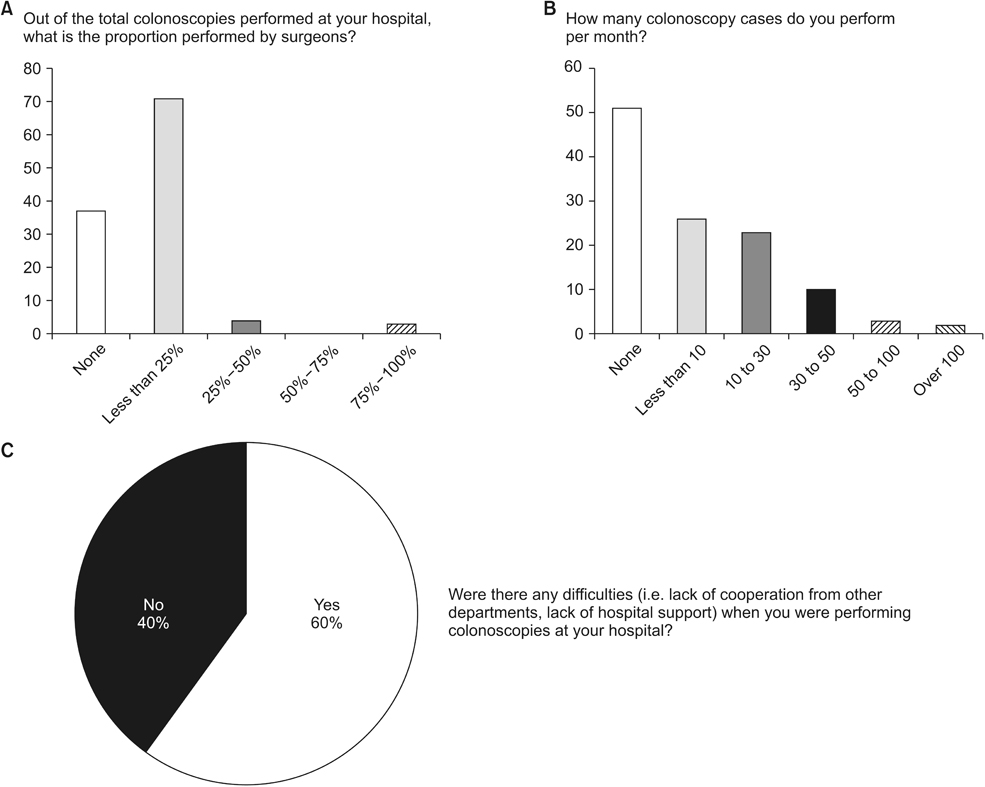Ann Surg Treat Res.
2018 Sep;95(3):121-128. 10.4174/astr.2018.95.3.121.
Colonoscopy education for surgical residents in Korea: a national survey of Korean Surgical Skill Study Group
- Affiliations
-
- 1Department of Surgery, Seoul National University Bundang Hospital, Seongnam, Korea.
- 2MediOffice, Seoul, Korea.
- 3Department of Surgery, School of Medicine, Kyung Hee University, Seoul, Korea.
- 4Department of Surgery, Seoul National University Hospital, Seoul, Korea.
- 5Department of Surgery, Samsung Medical Center, Sungkyunkwan University School of Medicine, Seoul, Korea. lwy555@skku.edu
- KMID: 2419441
- DOI: http://doi.org/10.4174/astr.2018.95.3.121
Abstract
- PURPOSE
A standardized colonoscopy training program surgical residents is still unestablished. The aim of this study was to assess the current status of colonoscopy training for surgical residents and collect the opinions on the direction for future colonoscopy education.
METHODS
A questionnaire survey containing 24 items was conducted by sending an email to 310 colorectal surgeons in 84 training hospitals across the country.
RESULTS
One hundred fifteen staff surgeons (115 of 310, 37%) of 84 institutions returned fully completed questionnaires. Most surgeons were working at tertiary hospitals with more than 5 years of clinical experience. About half of the responding surgeons answered that they perform colonoscopy in clinical practice and the main purpose of colonoscopy was follow-up after colorectal resection. Only 9 of 84 hospitals (10.7%) had a regular program on colonoscopy training for surgical residents. Most of colonoscopy education was conducted irregularly in a form of staff lecture, conferences or hands-on workshops. According to the future directions, 72 of 115 surgeons (62.6%) answered judging competency in colonoscopy should be needed for professional qualification of the surgeon. About 50 cases of colonoscopy seem appropriate during the 4-year-training of surgical residency, especially during the third- and fourth-year.
CONCLUSION
This survey shows colonoscopy education for surgical residents is still insufficient in Korea and that most surgeons feel that regular colonoscopy training is needed during the surgical residency period. There needs to be efforts to standardize the education program as well as various institutional and academic societal supports to achieve this goal.
Keyword
MeSH Terms
Figure
Reference
-
1. Choi KS, Jun JK, Lee HY, Hahm MI, Oh JH, Park EC. Increasing uptake of colorectal cancer screening in Korea: a populationbased study. BMC Public Health. 2010; 10:265.
Article2. Health Insurance Review & Assessment Service. Statistics of Practices (diagnosis/operations etc.) of National Interest [Internet]. Wonju (Korea): Health Insurance Review & Assessment Service;2017 Aug 1. Available from: http://opendata.hira.or.kr/op/opc/olapMfrnIntrsDiagBhvInfo.do.3. Jung KW, Won YJ, Oh CM, Kong HJ, Lee DH, Lee KH, et al. Cancer statistics in Korea: incidence, mortality, survival, and prevalence in 2014. Cancer Res Treat. 2017; 49:292–305.
Article4. Korean Surgical Society. Surgical Skill Education Information [Internet]. Seoul (Korea): Korean Surgical Society;2017 Jul 26. Available from: http://www.surgeryedu.or.kr/congress1/index.html?gubun=8&sgubun=9.5. Park DJ. Endoscopy education programs for surgical residents. 2012 Annual Meeting of the Korean Surgical Society [Internet]. Seoul (Korea): Korean Surgical Society;2017 Jul 26. Available from: https://www.surgery.or.kr/data/2012_spring_kss_newspirits.pdf.6. Jeong SK. Endoscopy education programs for surgical fellows and surgeons. 2012 Annual Meeting of the Korean Surgical Society [Internet]. Seoul (Korea): Korean Surgical Society;2017 Jul 26. Available from: https://www.surgery.or.kr/data/2012_spring_kss_newspirits.pdf.7. Max MH, Polk HC Jr. Perceived needs for gastrointestinal endoscopic training in surgical residencies. Am J Surg. 1982; 143:150–154.
Article8. Wexner SD, Garbus JE, Singh JJ. SAGES Colonoscopy Study Outcomes Group. A prospective analysis of 13,580 colonoscopies. Reevaluation of credentialing guidelines. Surg Endosc. 2001; 15:251–261.9. Vo DM, Gauvin JM, Chen SL. Endoscopy education in general surgery residencies: meeting the new RRC requirements. J Surg Res. 2010; 163:210–213.
Article10. Asfaha S, Alqahtani S, Hilsden RJ, MacLean AR, Beck PL. Assessment of endoscopic training of general surgery residents in a North American health region. Gastrointest Endosc. 2008; 68:1056–1062.
Article11. Pace D, Borgaonkar M, Evans B, Marcoux C, Lougheed M, Falk V, et al. Annual colonoscopy volume and maintenance of competency for surgeons. Surg Endosc. 2017; 31:2630–2635.
Article12. Fonseca AL, Reddy V, Yoo PS, Gusberg RJ, Longo WE. Senior surgical resident confidence in performing flexible endoscopy: what can we do differently? J Surg Educ. 2016; 73:311–316.
Article13. Sutton E, Chase SC, Klein R, Zhu Y, Godinez C, Youssef Y, et al. Development of simulator guidelines for resident assessment in flexible endoscopy. Am Surg. 2013; 79:14–22.
Article14. Hope WW, Hooks WB 3rd, Kilbourne SN, Adams A, Kotwall CA, Clancy TV. Assessing resident performance and training of colonoscopy in a general surgery training program. Surg Endosc. 2013; 27:1706–1710.
Article15. Park YH, Lim SM, Seo KH, Lee BI, Park CH. A study on the faculties' satisfaction of Korean medical schools for their educational, medical and research environment improvement. Res Inst Healthc Policy Rep. 2012; 6:1–165.16. Baxter NN, Warren JL, Barrett MJ, Stukel TA, Doria-Rose VP. Association between colonoscopy and colorectal cancer mortality in a US cohort according to site of cancer and colonoscopist specialty. J Clin Oncol. 2012; 30:2664–2669.
Article17. Marshall JB. Technical proficiency of trainees performing colonoscopy: a learning curve. Gastrointest Endosc. 1995; 42:287–291.
Article18. Lee SH, Chung IK, Kim SJ, Kim JO, Ko BM, Hwangbo Y, et al. An adequate level of training for technical competence in screening and diagnostic colonoscopy: a prospective multicenter evaluation of the learning curve. Gastrointest Endosc. 2008; 67:683–689.
Article19. Faigel DO, Cotton PB. World Organization of Digestive Endoscopy. The London OMED position statement for credentialing and quality assurance in digestive endoscopy. Endoscopy. 2009; 41:1069–1074.
Article20. ASGE Standards of Practice Committee. Faulx AL, Lightdale JR, Acosta RD, Agrawal D, Bruining DH, et al. Guidelines for privileging, credentialing, and proctoring to perform GI endoscopy. Gastrointest Endosc. 2017; 85:273–281.
Article
- Full Text Links
- Actions
-
Cited
- CITED
-
- Close
- Share
- Similar articles
-
- Knowledge of and Practice Patterns for Hereditary Colorectal Cancer Syndromes in Korean Surgical Residents
- Laparoscopic Appendectomy: A Safe Procedure that can be Performed by Surgical Residents
- Evaluation of the Educational Status of Internal Medicine Residency Program in Korea
- Survey of the Residency Training Program in Surgery
- Frozen-thawed Abdominal Flap Remnant as an education material for a Medium Group Surgical Skills Education Workshop



